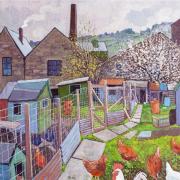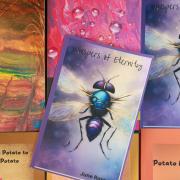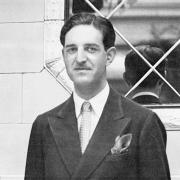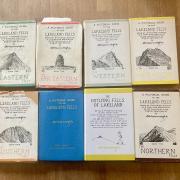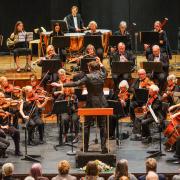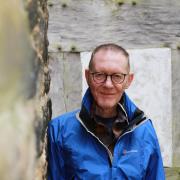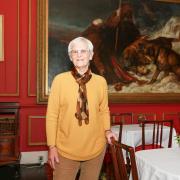As we prepare to mark the 75th anniversary of Victory in Europe, two sisters gagged by the Official Secrets Act reveal their remarkable wartime story. Roger Borrell spoke to them

Two sisters from Lancashire are about to reveal their cloak-and-dagger secrets from the Second World War. It’s a story that involves hush-hush bases used to eavesdrop on coded messages from German warships, working with Bletchley Park to help crack the Enigma Code and exotic postings to Cairo to help spies and resistance fighters.
Pat and Jean Owtram, now both in their 90s, were born in Dolphinholme, the daughters of a cotton mill owner whose own remarkable war story was revealed two years ago in Lancashire Life. Colonel Cary Owtram was taken prisoner by the Japanese and worked on the infamous Burma Railway. His story, 1,000 Days on the River Kwai, was published posthumously.
Now, his daughters are telling their own story in ‘Codebreaking Sisters – Our Secret War’. It was so secret that it was decades before they revealed to each other what they had done.
In the early part of the war their home, Newland Hall in Bay Horse, near Galgate, took in refugees fleeing the Nazis. Among these domestic staff was an Austrian woman called Lily, who taught the teenage girls to speak German.

When Pat left school she signed up for the Women’s Royal Naval Service, better known as the Wrens. ‘I was 16 when the war started and I was worried it would be over by the time I was old enough to join in,’ she said.
When she did join up, her application form revealed she was bi-lingual and she was sent to Liverpool for an interview. ‘I was terrified they were going to ask me to be a spy and jump out of aircraft. I was much too timid for that!,’ she said.
While she kept her feet on the ground, Pat was involved in vital work – so important that after the war the French presented her with their highest award, the Legion d’Honneur. ‘That was a big surprise,’ she said. ‘The French ambassador in London presented the medal and ribbon to me and afterwards we had a champagne tea at The Ritz. It was very jolly.’
Her days and nights were spent monitoring enemy messages from listening stations, first on the north east coast then to one of the busiest stations, between Dover and Folkestone. Her job was to search the airwaves for enemy messages that could give the Allies vital clues about German attacks.
‘Some of the messages we intercepted were in plain language and those were passed to the Royal Navy while anything that involved Enigma coding went straight to Bletchley Park,’ said Pat. ‘We also had to take bearings to identify the location of the enemy ships. It was a fascinating time, although it could be a little frustrating because you never found out whether the messages were important.’
It wasn’t all work and no play. ‘The social life was good, especially at Dover where there were RAF fighter stations. We had some good parties – we were told the RAF boys were able to fly across to Dublin and pick up supplies of gin! We never knew if it was true.’
After the war, Pat’s life was just as busy. She went to university, spent a year at Harvard and then joined the Daily Mail in Manchester as their only female reporter. She later moved to the BBC in London, where she met her husband, and was responsible for devising the TV quiz, Ask the Family, and was a producer on University Challenge. She later travelled the world with Patrick Moore as producer of The Sky at Night.
‘It transpired that when we joined the services, both my sister and I signed the Official Secrets Act and, on pain of death, we kept quiet about what we did. It was many years later that we told each other what we had done and I don’t think my mother ever knew.’
Meanwhile, Jean, who was two years younger, had to wait until her 18th birthday in 1943 to join the First Aid Nursing Yeomanry. As with her sister, it was her knowledge of German that brought her to the attention of the top brass and she was sent for an interview with the Special Operations Executive.
‘They were asking me if I did crosswords,’ said Jean. ‘I assumed they’d run out of sensible questions to ask. As it happened we used to do crosswords with my mother from a very young age.’ Her answer landed her a place working as a cipher and codes offer with the famous cryptographer Leo Marks. She was based in London’s Baker Street, where spies were trained and then planted in occupied Europe.
She and the team decoded and transmitted messages to members of the resistance and spies working behind enemy lines. ‘It was tremendously exciting – I’d never experienced anything like it.’
Eventually, Jean was posted abroad. ‘We sailed from Liverpool and didn’t have a clue where we were going,’ she said. The destination was the port of Alexandria and she travelled by train to her posting in Cairo – a journey resulted in all her luggage being stolen.
There, she once again spent her days supporting and communicating with British agents and local partisans fighting the Germans. ‘You can imagine what it would have been like for a young woman who had never been abroad to be suddenly pitched in 1940s Cairo. The backstreets were places where we learned a lot!’ she laughed. ‘We had been mainly schooled at home and had a governess. We were very proper young ladies.’
Trips to see the pyramids were punctuated by long hours with shifts often lasting through the night. From Egypt, she followed the Allied push into Europe by being posted to Bari on the Italian coast to communicate information that helped to clear roads for the advance north.
After D-Day, she was asked to go to the Far East but she needed her parents’ approval. Her mother told her she should be at home to greet her father when he came home so she turned down the offer. While he had been a POW he had assumed his daughters were safely at home.
She moved from codebreaking to helping refugees and then became a social worker before being appointed as the first careers officer at the newly-opened Lancaster University, where she met her husband. While Pat has lived in London for many years, Jean was happy to remain in Lancashire and still lives in the village of Wray.
‘We are very excited about the book coming out,’ said Jean. ‘It was a terrifically exciting time for us and it was meant to be very hush-hush. But I do remember getting the bus to work at the SOE in Baker Street and the conductor would shout that it was the stop for any spies on board!’
Codebreaking Sisters – Our Secret War by Patricia and Jean Owtram is being published by Mirror Books in July or you can read it now as an ebook purchased from amazon.co.uk.




